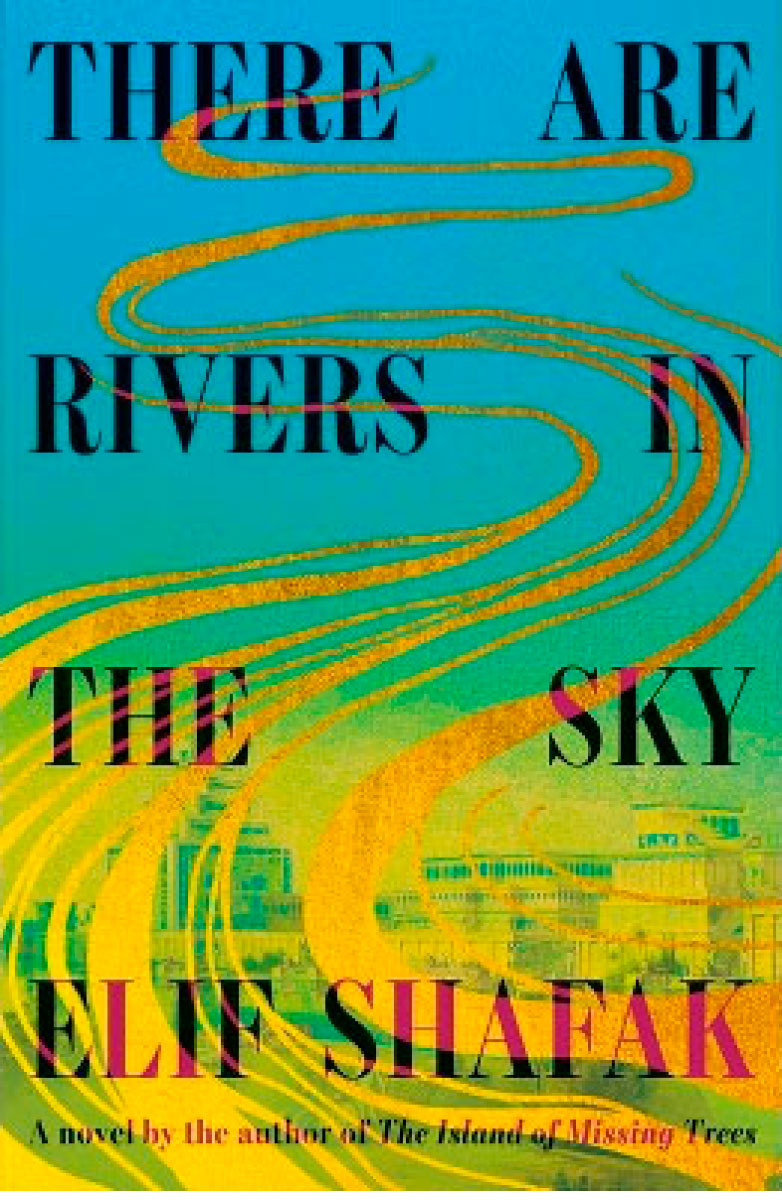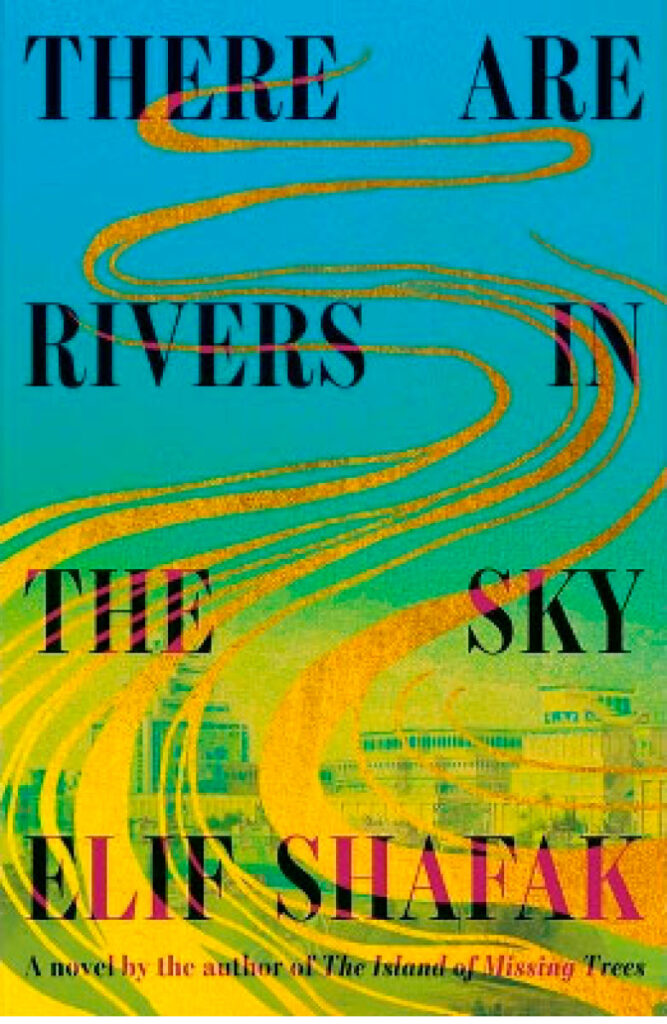

I am an Elif Shafak fan. This remarkable writer with over 20 novels under her belt writes in Turkish and English. Her storytelling is hard-hitting and brings to readers worlds we are unlikely to be familiar with, and tackles subjects such as child abuse and genocide. Her uncompromising examination of the Armenian genocide (which ‘official’ Turkey has consistently denied despite it being raised by other writers such as Orhan Pamuk as well) in The Bastard of Istanbul invited legal action from the authorities, forcing Shafak to move to the UK, where she still lives.
Her latest book, There are Rivers in the Sky, tackles the question of the Yazidis, a community of people from the region once known as Mesopotamia which included parts of Iraq, Syria, Turkey and Iran. Historically persecuted, with thousands of them systematically decimated over centuries, the Yazidis continue to be oppressed and reviled for their religious practices, particularly by the ISIS. Shafak approaches their lives through a narrative woven around the discovery by an Englishman — whose story also unfolds in the course of the novel — of ancient tablets inscribed with the verses of The Epic of Gilgamesh. And all this is held together by references to water, from a tiny drop to the rivers Tigris, Euphrates and Thames, among others. The Yazidis hold water particularly sacred. The novel opens with a drop of water falling on a king’s head, and, over the course of more than 400 pages, develops three separate plotlines featuring three different characters — Arthur, Narin, Zaleekhah — in three different times and places
The king is shown in Nineveh, a rich and prosperous city on the banks of the Tigris, where Ashurbanipal is gazing proudly upon his splendid city: ‘He reigns over an empire so immense that they hail him as “The Emperor of the Four Quarters of the World”. Some day he will also be remembered and renowned as “The Librarian King”, “The Educated Monarch”, “The Erudite Ruler of Mesopotamia” — titles that will make people forget that, whilst he may have been highly learned and cultured, he was no less cruel than his predecessors.’ Amongst his most prized possessions is a section of a poem about a hero called Gilgamesh.
The name immediately brought to mind — and tears to my eyes — a dear friend exclaiming in horror: ‘You don’t know The Epic of Gilgamesh?! You’re a student of literature! He’s the hero of what’s believed to be the first literary work committed to writing. Recorded in cuneiform. You don’t know?!’ I didn’t and wasn’t ashamed to admit as much because my friend was a genius, and what can you do in the face of genius but confess ignorance. We lost that friend, suddenly, unexpectedly, barely a year ago. When I thought I would spend a lovely weekend with her in her home in the US last year, I ended up attending a memorial service instead. Incidentally, cuneiform is a writing system used between the early Bronze Age and the beginning of the Common Era in what is now West Asia / the Middle East (depending upon which side of the region you live). This epic is believed to have inspired the tradition of hero poems, such as the Iliad and the Odyssey.
The Ancient Mesopotamians are famed for inventing writing, mathematics, astronomy, irrigation and the wheel, but their biggest discovery has gone unrecognized. They are the first to experience the pain of losing a motherland.
Sometimes, I look up reviews just to see what other people think but usually never before getting into a book myself. Idle curiosity, you could say. And even though reviews rarely influence either the decision to read or my opinion, they do provide insight. I was halfway into There are Rivers when I saw the Guardian review which said the novel was ‘hard going’, mainly on account of baggy structure and sentences, sentimentality, superfluity and endless analogies to do with water, although it did commend certain other sections. My ordinary, curious, reader’s mind found the storytelling engaging, informative and connected to contemporary realities. And even if the coming together of various plotlines was predictable, the worldview the novel offers, prompted me to reflect on the history of human behaviour and stop to take in the full import of observations made through the voice of various characters or the author herself.
For instance, soldiers capture Ashurbanipal’s mentor whom they accuse of being a traitor, and bring him, bound in chains, before the king. Growing up, Ashurbanipal has spent endless hours reciting Gilgamesh with the mentor. As he kneels before his former ward, the old man says, ‘Gilgamesh… He wished to conquer death and so he travelled to the ends of the world — but he failed. He did not see that the only way to become immortal is to be remembered after you are gone, and the only way to be remembered is to leave behind a good story. My king, why is it that you chose to make your story such a heartless one?’

Shafak artfully, if sometimes predictably, weaves together the storylines until they coalesce eventually to present the big picture. There was even a sense of déjà vu when I discovered that nine-year-old Narin, an important protagonist in the novel, is gradually losing her hearing. We had just read a book called True Biz by Sara Novic in our book club (it received passing mention in Wordsworld June 2023); that book is set in a school for the hearing impaired. Doctors say Narin will lose her hearing completely in eight months and so, before the squeal of infants and the bleating of lambs become merely recollections for Narin, Grandmother Besma wants to get her baptised at a place sacred to the Yazidis, called Lalish. She wants her to ‘hear the birds, susurrations and prayers of the sacred Valley of Lalish for the first and last time. Narin should behold the one place on earth where despair turns into hope and even the loneliest souls find solace.’ But before they can get there, thousands of Yazidis hiding in the Sinjar mountains are killed and thousands of women and children abducted in the August 2014 genocide by ISIS. This historical event is brilliantly and movingly described in the novel, as are many other true events. Some characters too are based on actual people.
Arthur, who goes to Mesopotamia to search for a missing section of Gilgamesh, realises how empires deceive themselves into believing they will last forever, just because they are powerful for a time. His archaeological findings provide enough evidence of that, and of how even the mightiest rulers feared death. Indeed, ‘Arthur is beginning to suspect that civilization is the name we give to what little we have salvaged from a loss that no one wants to remember. Triumphs are erected upon the jerry-built scaffolding of brutalities untold, heroic legends spun from the thread of aggressions and atrocities. The irrigation system was Nineveh’s glowing achievement — but how many lives were squandered in its construction. There is always another side, a forgotten side.’
In the hurly-burly of so-called modern life, most of us appear to be relinquishing our humanity for money, power, and other material things. Shafak serves a warning regarding this as the novel winds to a close: ‘The Ancient Mesopotamians are famed for inventing writing, mathematics, astronomy, irrigation and the wheel, but their biggest discovery has gone unrecognized. They are the first to experience the pain of losing a motherland.’ Centuries down the road, the pain of losing a motherland remains ever present — here, now, and all around.
The columnist is a children’s writer and senior journalist






